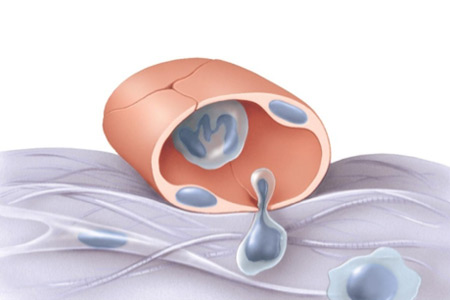Nano-Mechano-Biology on living cell membranes
Cell Biophysics & Physical BiologyProject description
Cells of the immune system are constantly under mechanical stress. During inflammation, monocytes adhere and roll over the activated endothelium to extravasate and migrate towards the site of inflammation. Dendritic cells, in turn, extend long cytoskeletal projections to sample environmental antigens and, upon maturation, they migrate towards lymph nodes to activate antigen specific T-cells. All these cell functions involve mechanical activity and they occur in the presence of mechanical stresses. While the central role of cell mechanics and adhesion in inflammation has long been recognized, the actual mechanisms by which inflammatory cells sense and respond to the mechanical stresses are poorly understood. To a substantial extent, this limitation is due to the lack of a physical picture capturing the molecular events that follow the application of physical forces onto the surface of immune cells.
The goal of the project is to explore the effect of mechanical forces on the spatiotemporal organization of mechano-sensitive receptors (integrins) on the membrane of cells of the immune system and its functional role in modulating cellular adhesion.
ICFO groups associated with the project
ICFO publications associated with the project
-
Nanoclustering as a dominant feature of plasma membrane organization
M.F. Garcia-Parajo, A. Cambi, J.A. Torreno-Pina, N. Thompson, and K. Jacobson,Journal of Cell Science, vol. 127, pp. 4995-5005, 2014.
-
Priming by Chemokines Restricts Lateral Mobility of the Adhesion Receptor LFA-1 and Restores Adhesion to ICAM-1 Nano-Aggregates on Human Mature Dendritic Cells
K.J.E. Borgman, T.S. van Zanten, C. Manzo, R. Cabezón, A. Cambi, D. Benítez-Ribas, and M.F. Garcia-Parajo,PLoS ONE, vol. 9, pp. e99589, 2014.
-
Lateral mobility of individual integrin nanoclusters orchestrates the onset for leukocyte adhesion
G.J. Bakker, C. Eich, J.A. Torreno-Pina, R. Diez-Ahedo, G. Perez-Samper, T.S. van Zanten, C.G. Figdor, A. Cambi, and M.F. Garcia-Parajo,Proceedings of the National Academy of Sciences, vol. 109, pp. 4869-4874, 2012.
External collaborations
Prof. Jitu Mayor (NCBS, Bangalore, India), Prof. Diane Lidke (UNM, USA), Dr. Alessandra Cambi (NCMLS, Nijmegen, Netherlands)
Funding
HFSP advanced grant; MINECO Severo Ochoa, Fundacio Privada CELLEX Barcelona, MICINN– Plan Nacional MAT2011-22887: IMMU-NANO-FORCE; MINECO-FIS2014-56107-R

